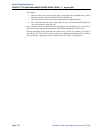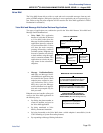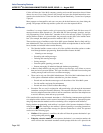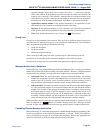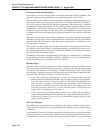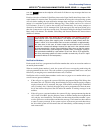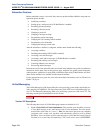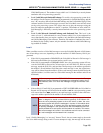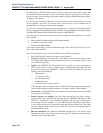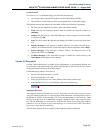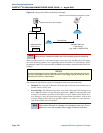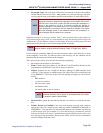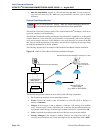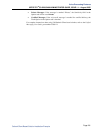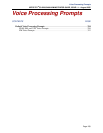
Voice Processing Features
INTER-TEL
®
CS-5200/5400 ADMINISTRATOR GUIDE, ISSUE 1.1 – August 2005
Page 286 Level 1
the administrator’s E-mail Address instead of to the sender of the Voice Mail message. The
user should forward the message or send a new message instead of replying. In Levels 2 and 3,
the user can reply to any message from another mailbox, using the Outlook/Exchange “Reply”
or “Reply to All” options.
E-mail messages containing .wav files can be forwarded to other e-mail addresses or stored
on the computer’s local drive, just like any other e-mail message. Or, the .wav file can be
detached from the message and stored on the computer.
To use Level 1 Unified Messaging, the customer must have an existing e-mail system based on
Message Application Programming Interface (MAPI), Vendor Independent Messaging (VIM),
or Simple Mail Transport Protocol/Post Office Protocol (SMTP/POP3).
The following list shows the e-mail systems that are supported, and the protocols on which
they are based:
• Microsoft Mail or Microsoft Outlook/Exchange (MAPI)
• cc: Mail or Lotus Notes (VIM)
• Internet mail (SMTP/POP3)
For complete instructions on using Unified Messaging, refer to the Unified Messaging User
Guide, part number 550.8111.
The e-mail message sent by the Voice Mail will have the following components:
• To: The TO line will contain the recipient’s e-mail address.
• From: The FROM line will contain the e-mail address of the voice processing system.
If an E-Mail Real Name has been programmed for the voice processing system, it will
also be shown on this line.
• Subject: The SUBJECT line will contain the line “<length of message> Message for
MB <number> from <source>.” If the message is marked priority, the subject line will
be preceded by the word “PRIORITY.” The source of the Voice Mail message will
appear as one of the following:
—MB <number>
—x <extension number>
— the Voice Mail system
— an unknown caller
— an outside caller at <phone number>
If the message is from an extension ID or a mailbox, the programmed username will be
shown inside parentheses after the number. For example: mailbox 1000 (ADMIN).
• Received on: The RECEIVED ON line contains the date and time that the Voice Mail
was received by the mailbox.
• Priority, Private, or Certified: If the Voice Mail message was sent with a delivery
option, the body will contain the line “Message marked <PRIORITY, PRIVATE or CER-
TIFIED>.” Note that this is for informational purposes only and does not affect the e-
mail message itself. For example, if a Voice Mail message is marked for certified deliv-
ery, the sender will receive a confirmation when the recipient listens to the Voice Mail
message using the mailbox. However, the sender will not receive confirmation when the
recipient reads the e-mail.
• WAV file attachment: The .wav file attachment will appear as a file with the name
vm.wav. To listen to the message, the user must play the .wav file using multimedia
software (such as Sound Recorder).



